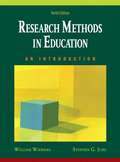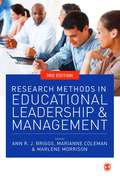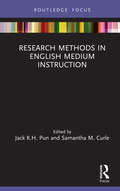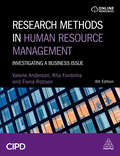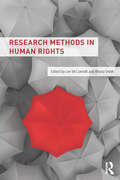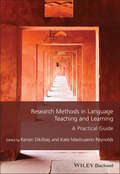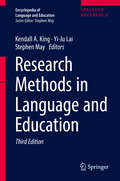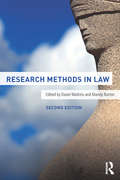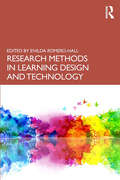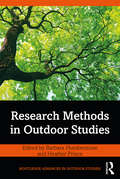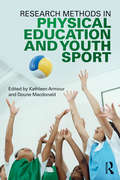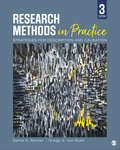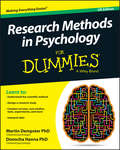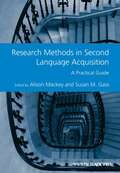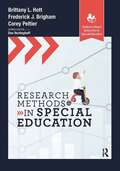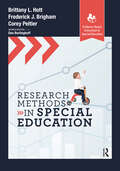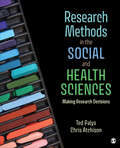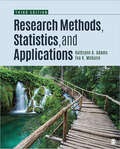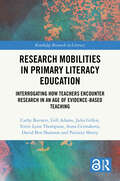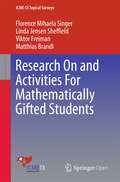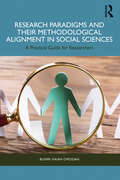- Table View
- List View
Research Methods in Education: An Introduction (9th Edition)
by William Wiersma Stephen G. JursA classic in its field, Research Methods in Education explains the research process with emphasis on the formulation of a research question, referencing current literature in the field, using appropriate research designs, and writing and evaluating research reports. Both quantitative and qualitative research designs are described. Measurement, sampling, and statistics are presented as essential research tools. Retaining the clear, concise writing style and organization that has made this text so popular,Research Methods in Education helps students evaluate research literature as well as master research methodology. It emphasizes the rationale for commonly used research procedures and their applications. The authors outline the nature of educational research and clearly define the steps in the research process. The text is broad in scope-covering both quantitative, qualitative and mixed methods research methodologies as well as describing how to write research proposals and reports of completed research. Research Methods in Education gives students a solid understanding of all the elements of research.
Research Methods in Educational Leadership and Management
by Ann R. J. BriggsThis classic guide continues to be the leading Research Methods text that specifically deals with Educational Leadership and Management. The collection boasts an array of high-profile international expert contributors, covering a wide range of specialisms, emphasising the importance of the critically engaged practitioner. Accessible and user-friendly, this edition has been fully revised and updated to take full account of online research. It features new authors, more case studies and examples, and brand new chapters on: - research Design - grounded research - ethnography - discourse analysis - narrative / Life history - student voice Whether you are postgraduate, an academic, or a practitioner researcher, if you are investigating Research Methods, Leadership & Management or Educational Research, this is the book you will need.
Research Methods in English Medium Instruction (Routledge Research in Higher Education)
by Jack K.H. Pun; Samantha M. CurleIn this special edited volume, the editors and invited English Medium Instruction (EMI) researchers, from different parts of the world, outline the latest EMI research methods. Providing academic instruction using English is rapidly spreading in many countries where English is a second or foreign language, and there is a growing interest in researching the effectiveness and effects of EMI across different educational levels. This volume includes chapters on everything from research into classroom interaction to teachers’ and students’ perceptions and motivations to language challenges and strategies and the pedagogical implications of translanguaging in EMI classrooms. These specific topics were chosen to reflect different approaches to researching EMI. Each chapter focuses on a specific type of research methodology. It begins with an overview of the literature of the topic under discussion. Then an example study is provided to illustrate how this methodology can be used to investigate EMI. Each chapter identifies the process that the EMI researcher used to conduct their research and discusses key dilemmas they faced, focusing particularly on the methodological issues they encountered. By exploring these issues, this volume hopes to inform theory (or the lack thereof) underlying research into the phenomenon of EMI. This volume is indispensable for EMI tutors, curriculum developers, policymakers, and teachers, as well as students at both undergraduate and postgraduate levels. It is particularly valuable for researchers from across the globe working in the fields of applied linguistics, language education, English for Academic Purposes (EAP), English Language Teaching (ELT), and Teaching English to Speakers of Other Languages (TESOL).
Research Methods in Human Resource Management: Investigating a Business Issue
by Valerie Anderson Dr Rita Fontinha Dr Fiona RobsonResearch Methods in Human Resource Management is a key resource for anyone undertaking a research report or dissertation. It covers the planning and execution of HRM research projects, from investigating and researching HR issues to designing and implementing research and then evaluating and reviewing the results. Filled with international examples to provide a global perspective, this fully updated 4th edition of Research Methods in Human Resource Management balances theoretical frameworks and practical guidance. Fully updated throughout, this edition now includes increased discussion of methodological issues, more real-life examples and international case studies and best practice sample literature reviews and write-ups. 'Review and Reflect' sections at the end of each chapter help to consolidate learning and explain how it can aid professional development. This book is fully mapped to the CIPD Level 7 Advanced module on Investigating a Business Issue from an HR Perspective, and multiple-choice questions and a glossary of terms help students understand the key concepts and use the terminology confidently. Online supporting resources for lecturers include an instructor's manual and lecture slides and there are annotated web links, further reading and new reflective questions for students.
Research Methods in Human Rights
by Rhona Smith Lee McConnellResearch Methods in Human Rights introduces the reader to key methodological approaches to Human Rights research in a clear and accessible way. Drawing on the expertise of a panel of contributors, the text clearly explains the key theories and methods commonly used in Human Rights research and provides guidance on when each approach is appropriate. It addresses such approaches to Human Rights research as qualitative methods, quantitative analysis, critical ethnography and comparative approaches, supported by a wide range of geographic case studies and with reference to a wide range of subject areas. The book suggests further reading and directs the reader to excellent examples from research outputs of each method in practice. This book is essential reading for students with backgrounds in law as well as political and social sciences who wish to understand more about the methods and ethics of conducting Human Rights research.
Research Methods in Language Teaching and Learning: A Practical Guide (Guides to Research Methods in Language and Linguistics)
by Li WeiA practical guide to the methodologies used in language teaching and learning research, providing expert advice and real-life examples from leading TESOL researches Research Methods in Language Teaching and Learning provides practical guidance on the primary research methods used in second language teaching, learning, and education. Designed to support researchers and students in language education and learning, this highly accessible book covers a wide range of research methodologies in the context of actual practice to help readers fully understand the process of conducting research. Organized into three parts, the book covers qualitative studies, quantitative studies, and systematic reviews. Contributions by an international team of distinguished researchers and practitioners explain and demonstrate narrative inquiry, discourse analysis, ethnography, heuristic inquiry, mixed methods, experimental and quasi-experimental studies, and more. Each chapter presents an overview of a method of research, an in-depth description of the research framework or data analysis process, and a meta-analysis of choices made and challenges encountered. Offering invaluable insights and hands-on research knowledge to students and early-career practitioners alike, this book: Focuses on the research methods, techniques, tools, and practical aspects of performing research Provides firsthand narratives and case studies to explain the decisions researchers make Compares the relative strengths and weaknesses of different research methods Includes real-world examples for each research method and framework to highlight the context of the study Includes extensive references, further reading suggestions, and end-of-chapter review questions Part of the Guides to Research Methods in Language and Linguistics series, Research Methods in Language Teaching and Learning is essential reading for students, educators, and researchers in all related fields, including TESOL, second language acquisition, English language teaching, and applied linguistics.
Research Methods in Language and Education
by Stephen May Kendall A. King Yi-Ju LaiIn this third, fully revised edition, the 10 volume Encyclopedia of Language and Education offers the newest developments, including an entirely new volume of research and scholarly content, essential to the field of language teaching and learning in the age of globalization. In the selection of topics and contributors, the Encyclopedia reflects the depth of disciplinary knowledge, breadth of interdisciplinary perspective, and diversity of socio-geographic experience in the language and education field. Throughout, there is an inclusion of contributions from non-English speaking and non-western parts of the world, providing truly global coverage. Furthermore, the authors have sought to integrate these voices fully into the whole, rather than as special cases or international perspectives in separate sections. The Encyclopedia is a necessary reference set for every university and college library in the world that serves a faculty or school of education, as well as being highly relevant to the fields of applied and socio-linguistics. The publication of this work charts the further deepening and broadening of the field of language and education since the publication of the first edition of the Encyclopedia in 1997 and the second edition in 2008.
Research Methods in Law
by Dawn Watkins and Mandy BurtonExplaining in clear terms some of the main methodological approaches to legal research, the chapters in this edited collection are written by specialists in their fields, researching in a variety of jurisdictions. Covering a range of topics from Feminist Approaches to Law and Economics, each contributor addresses the topic of ‘lay decision makers in the legal system’ from their particular methodological perspective, explaining how they would approach the issue and discussing the suitability of their particular method. This focus on one main topic allows the reader to draw comparisons between methods with relative ease. The broad range of contributors makes Research Methods in Law well suited to an international audience, and it is ideal reading for PhD students in law, undergraduate dissertation students in law, LL.M Research students and early year researchers.
Research Methods in Learning Design and Technology
by Enilda Romero-HallResearch Methods in Learning Design and Technology explores the many forms, both new and established, that research takes within the field of instructional design and technology (IDT). Chapters by experienced IDT researchers address methodologies such as meta-analysis, social media research, user experience design research, eye-tracking research, and phenomenology, situating each approach within the broader context of how IDT research has evolved and continues to evolve over time. This comprehensive, up-to-date volume familiarizes graduate students, faculty, and instructional design practitioners with the full spectrum of approaches available for investigating the new and changing educational landscapes. The book also discusses the history and prospective future of research methodologies in the IDT field.
Research Methods in Outdoor Studies (Routledge Advances in Outdoor Studies)
by Barbara Humberstone Heather PrinceOver the last two decades Outdoor Studies has emerged as an innovative and vibrant field of study. This is the first book to offer a comprehensive appraisal of established and cutting-edge research methods as applied to Outdoor Studies. Covering qualitative, quantitative and mixed methods, the book examines key methodologies, themes and technologies such as digital research, mobile methodologies, ethnography, interviews, research design, research ethics and ways of disseminating research. Featuring contributions from leading researchers from a variety of disciplinary backgrounds, this is an essential text for any Outdoor Studies course or for researchers looking for innovative and creative research techniques.
Research Methods in Physical Education and Youth Sport
by Kathleen Armour Doune MacdonaldThis is the first research methods book to focus entirely on physical education and youth sport. It guides the reader through the whole research process; from the first steps to completion of a dissertation or practice-based project, and introduces key topics such as: formulating a research question qualitative approaches quantitative approaches mixed method research literature review case studies survey, interviews and focus groups data analysis writing the dissertation. Each chapter includes a full range of useful pedagogical features, including chapter summaries, practical activities, case studies, dialogues with active researchers and guidance on further reading and resources. With contributions from some of the world’s best-known researchers in the field, this book is indispensible reading for all students and professionals working in physical education, youth sport, sports coaching and related subjects.
Research Methods in Practice: Strategies for Description and Causation
by Dahlia K. Remler Gregg G. Van RyzinThoroughly updated to reflect changes in both research and methods, this Third Edition of Remler and Van Ryzin’s innovative, standard-setting text is imbued with a deep commitment to making social and policy research methods accessible and meaningful. Research Methods in Practice: Strategies for Description and Causation motivates readers to examine the logic and limits of social science research from academic journals and government reports. A central theme of causation versus description runs through the text, emphasizing the idea that causal research is essential to understanding the origins of social problems and their potential solutions. Readers will find excitement in the research experience as the best hope for improving the world in which we live, while also acknowledging the trade-offs and uncertainties in real-world research.
Research Methods in Practice: Strategies for Description and Causation
by Dahlia K. Remler Gregg G. Van RyzinThoroughly updated to reflect changes in both research and methods, this Third Edition of Remler and Van Ryzin’s innovative, standard-setting text is imbued with a deep commitment to making social and policy research methods accessible and meaningful. Research Methods in Practice: Strategies for Description and Causation motivates readers to examine the logic and limits of social science research from academic journals and government reports. A central theme of causation versus description runs through the text, emphasizing the idea that causal research is essential to understanding the origins of social problems and their potential solutions. Readers will find excitement in the research experience as the best hope for improving the world in which we live, while also acknowledging the trade-offs and uncertainties in real-world research.
Research Methods in Psychology For Dummies
by Donncha Hanna Martin DempsterYour hands-on introduction to research methods in psychology Looking for an easily accessible overview of research methods in psychology? This is the book for you! Whether you need to get ahead in class, you're pressed for time, or you just want a take on a topic that's not covered in your textbook, Research Methods in Psychology For Dummies has you covered. Written in plain English and packed with easy-to-follow instruction, this friendly guide takes the intimidation out of the subject and tackles the fundamentals of psychology research in a way that makes it approachable and comprehensible, no matter your background. Inside, you'll find expert coverage of qualitative and quantitative research methods, including surveys, case studies, laboratory observations, tests and experiments--and much more. Serves as an excellent supplement to course textbooks Provides a clear introduction to the scientific method Presents the methodologies and techniques used in psychology research Written by the authors of Psychology Statistics For Dummies If you're a first or second year psychology student and want to supplement your doorstop-sized psychology textbook--and boost your chances of scoring higher at exam time--this hands-on guide breaks down the subject into easily digestible bits and propels you towards success.
Research Methods in Second Language Acquisition: A Practical Guide
by Alison Mackey Susan M. GassResearch Methods in Second Language Acquisition: A Practical Guideis an informative guide to research design and methodology for graduate students and scholars. Each chapter of this volume offers background, step-by-step guidance, and relevant studies to create comprehensive coverage of each method. Includes chapters by expert scholars on an array of topics, including second language writing and reading, meta-analyses, research replication, qualitative data collection and analysis, and more Includes feature boxes in each chapter highlighting relevant research studies, discussion questions and suggested further readings Utilizes research methods and tools from varied fields of study including education, linguistics, psychology, and sociology
Research Methods in Special Education
by Brittany Hott Frederick Brigham Corey PeltierResearch Methods in Special Education equips readers with the knowledge needed to make a difference with data. Authors Drs. Brittany L. Hott, Frederick J. Brigham, and Corey Peltier provide access to cutting edge methodologies and related skills researchers need to successfully carry out projects in applied settings. Dedicated chapters focusing on quantitative research synthesis (e.g., meta-analysis, meta-synthesis), single case design, and program evaluation methods allow readers deeply invested in the field of special education to develop a firm foundation, enabling them to ask and answer their socially significant research questions. Written for students in special education teacher prep programs, early career faculty, school administrators, and curriculum specialists, this text includes numerous features that set it apart from other available resources: Dedicated chapters on ethics, establishing effective research partnerships, and evidence-based practice Cutting-edge program evaluation methods and reporting Comprehensive coverage of methods commonly used in special education Detailed information on securing special education funding Case studies, exemplars, resources, and recommendations for additional reading Included with the text are online supplemental materials for faculty use in the classroom. YouTube videos featuring interviews with authors The up-to-date research practices in this text are a valuable addition for educators and researchers serving students with disabilities who have a responsibility to support in-school and post-school outcomes. Research Methods in Special Education gives educators the tools to facilitate a deeper understanding of the research process and evidence-based practice.
Research Methods in Special Education (Evidence-Based Instruction in Special Education)
by Brittany Hott Frederick Brigham Corey PeltierResearch Methods in Special Education equips readers with the knowledge needed to make a difference with data. Authors Drs. Brittany L. Hott, Frederick J. Brigham, and Corey Peltier provide access to cutting edge methodologies and related skills researchers need to successfully carry out projects in applied settings. Dedicated chapters focusing on quantitative research synthesis (e.g., meta-analysis, meta-synthesis), single case design, and program evaluation methods allow readers deeply invested in the field of special education to develop a firm foundation, enabling them to ask and answer their socially significant research questions.Written for students in special education teacher prep programs, early career faculty, school administrators, and curriculum specialists, this text includes numerous features that set it apart from other available resources: Dedicated chapters on ethics, establishing effective research partnerships, and evidence-based practice Cutting-edge program evaluation methods and reporting Comprehensive coverage of methods commonly used in special education Detailed information on securing special education funding Case studies, exemplars, resources, and recommendations for additional reading Included with the text are online supplemental materials for faculty use in the classroom. YouTube videos featuring interviews with authors The up-to-date research practices in this text are a valuable addition for educators and researchers serving students with disabilities who have a responsibility to support in-school and post-school outcomes. Research Methods in Special Education gives educators the tools to facilitate a deeper understanding of the research process and evidence-based practice.
Research Methods in the Social and Health Sciences: Making Research Decisions
by Ted Palys Chris AtchisonResearch Methods in the Social and Health Sciences: Research Decisions, by Ted Palys and Chris Atchison, gives students a thorough, thoughtful, and highly readable introduction to the entire research process from start to finish. From its underlying premise that your research questions and objectives, rather than any specific method, should guide your research, this book discusses each step of the research process, from limiting the scope of a literature review to navigating ethical considerations to deciding which methods are best suited for finding answers to specific research questions to how to analyze data and present findings. Readers are encouraged to think deeply about each step of the research process. The book promotes this deliberation by discussing the strengths and limitations of different methods and. Throughout the process, the authors provide many examples from their own and student research, sharing insights for research decisions arising from that experience. Readers will develop the skills to create solid research questions, perform literature reviews, identify appropriate data sources and methods, conduct research, analyze and interpret data and translate the resulting knowledge generated from the research process to a wider audience– all core parts of the research process –by developing their knowledge and creating confidence in their own decision-making skills. After explaining the unique and often complementary strengths of qualitative and quantitative methods, students focus on what methods are best suited for finding answers to the research questions that interest them. Major types of research including experiments, case studies, surveys, quasi-experiments, ethnographies, focus groups, participatory action research, and archival studies all receive significant coverage. The text illustrates how these methods are enhanced by integrating them with 21st century technologies and combining them in mixed methods projects. Chapters on constructing a research proposal and disseminating research bookend the process with concrete steps in between to support students designing their own original research projects. Study questions at the end of each chapter encourage students to think critically about the research process and how the choices a researcher makes will broaden or constrain what they can find. By the end of the text, social and health science students will feel confident in undertaking ethical and thoughtful research.
Research Methods in the Social and Health Sciences: Making Research Decisions
by Ted Palys Chris AtchisonResearch Methods in the Social and Health Sciences: Research Decisions, by Ted Palys and Chris Atchison, gives students a thorough, thoughtful, and highly readable introduction to the entire research process from start to finish. From its underlying premise that your research questions and objectives, rather than any specific method, should guide your research, this book discusses each step of the research process, from limiting the scope of a literature review to navigating ethical considerations to deciding which methods are best suited for finding answers to specific research questions to how to analyze data and present findings. Readers are encouraged to think deeply about each step of the research process. The book promotes this deliberation by discussing the strengths and limitations of different methods and. Throughout the process, the authors provide many examples from their own and student research, sharing insights for research decisions arising from that experience. Readers will develop the skills to create solid research questions, perform literature reviews, identify appropriate data sources and methods, conduct research, analyze and interpret data and translate the resulting knowledge generated from the research process to a wider audience– all core parts of the research process –by developing their knowledge and creating confidence in their own decision-making skills. After explaining the unique and often complementary strengths of qualitative and quantitative methods, students focus on what methods are best suited for finding answers to the research questions that interest them. Major types of research including experiments, case studies, surveys, quasi-experiments, ethnographies, focus groups, participatory action research, and archival studies all receive significant coverage. The text illustrates how these methods are enhanced by integrating them with 21st century technologies and combining them in mixed methods projects. Chapters on constructing a research proposal and disseminating research bookend the process with concrete steps in between to support students designing their own original research projects. Study questions at the end of each chapter encourage students to think critically about the research process and how the choices a researcher makes will broaden or constrain what they can find. By the end of the text, social and health science students will feel confident in undertaking ethical and thoughtful research.
Research Methods, Statistics, and Applications
by Kathrynn A. Adams Eva Kung McGuire (aka: Lawrence)Research Methods, Statistics, and Applications by Kathrynn A. Adams and Eva K. McGuire is designed to give students the experience of being a researcher by combining the interrelated concepts of research methods and statistics to better explain how the research process incorporates both elements. Employing a conversational tone throughout, coupled with an emphasis on decision-making, this best-selling text will spark students’ interest in conducting research and improve their ability to critically analyze research in their daily lives. The Third Edition includes a new chapter on measurement to better highlight its critical importance, updates for the 7th edition of the Publication Manual of the American Psychological Association, new examples related to social justice, additional sections on qualitative research methods, and more thorough integration of research ethics information and tips throughout each chapter.
Research Methods, Statistics, and Applications
by Kathrynn A. Adams Eva Kung McGuire (aka: Lawrence)Research Methods, Statistics, and Applications by Kathrynn A. Adams and Eva K. McGuire is designed to give students the experience of being a researcher by combining the interrelated concepts of research methods and statistics to better explain how the research process incorporates both elements. Employing a conversational tone throughout, coupled with an emphasis on decision-making, this best-selling text will spark students’ interest in conducting research and improve their ability to critically analyze research in their daily lives. The Third Edition includes a new chapter on measurement to better highlight its critical importance, updates for the 7th edition of the Publication Manual of the American Psychological Association, new examples related to social justice, additional sections on qualitative research methods, and more thorough integration of research ethics information and tips throughout each chapter.
Research Mobilities in Primary Literacy Education: Interrogating How Teachers Encounter Research in an Age of Evidence-based Teaching (Routledge Research in Literacy)
by Julia Gillen Cathy Burnett Gill Adams Terrie Lynn Thompson David Ben Shannon Parinita Shetty Anna CermakovaThis book delves into the intriguing question of why certain types of literacy research gain more traction than others in educational settings.It draws upon findings from Research Mobilities in Primary Literacy Education, an innovative and interdisciplinary study conducted in England and supported by the Economic and Social Research Council [ES/W000571/1]. The study investigated the types of literacy research that reach teachers, the ways in which human and non-human actors mobilise research and the transformation of research as it circulates. The book argues that, for teachers to foster genuinely inclusive literacy classrooms, they need to be equipped to draw on understandings associated with a variety of theoretical perspectives and research traditions. It further explores the dynamics of research dissemination and the factors that influence the uptake and application of research findings in educational contexts. This work is an original and groundbreaking contribution to debates about the scope and focus of literacy education, the role of evidence-based teaching and approaches to professional learning.This book is of vital interest to scholars, researchers and students with interests in Literacy Education, Professional Development and the Ethics of Research. It challenges conventional wisdom, provokes thoughtful discussion and inspires readers to rethink the role and value of research in shaping literacy education that is inclusive, effective and meaningful.
Research On and Activities For Mathematically Gifted Students (ICME-13 Monographs)
by Linda Jensen Sheffield Florence Mihaela Singer Viktor Freiman Matthias BrandlThis Topical Survey offers a brief overview of the current state of research on and activities for mathematically gifted students around the world. This is of interest to a broad readership, including educational researchers, research mathematicians, mathematics teachers, teacher educators, curriculum designers, doctoral students, and other stakeholders. It first discusses research concerning the nature of mathematical giftedness, including theoretical frameworks and methodologies that are helpful in identifying and/or creating mathematically gifted students, which is described in this section. It also focuses on research on and the development of mathematical talent and innovation in students, including connections between cognitive, social and affective aspects of mathematically gifted students. Exemplary teaching and learning practices, curricula and a variety of programs that contribute to the development of mathematical talent, gifts, and passion are described as well as the pedagogy and mathematics content suitable for educating pre-service and in-service teachers of mathematically gifted students. The final section provides a brief summary of the paper along with suggestions for the research, activities, and resources that should be available to support mathematically gifted students and their teachers, parents, and other stakeholders.
Research Outside The Academy: Professional Knowledge-making In The Digital Age
by Lisa Börjesson Isto HuvilaThis book analyses the practical, information-related dimensions of professional knowledge making and communication in extra-academic organisations. It treats the sites where research takes place and where knowledge is created outside academia in the light, among other things, of new digital resources. It provides valuable insight into the practices through which extra-academic research data and results are produced and made available and the settings in which this takes place. With case studies of knowledge-making in government organizations and state research institutes, as well as in cultural and heritage institutions, this book broadens the perspective on knowledge sharing, communication and publication, and how knowing changes as a result of the professional knowledge-making practices in the digital age.Research outside the Academy is ideal for students at all levels looking for an introduction to the topic of research and knowledge-making in society. Moreover, researchers and professionals in the fields of library and information science and science and technology studies will find the book to be adding to previous understandings of scholarly documentation and communication.
Research Paradigms and Their Methodological Alignment in Social Sciences: A Practical Guide for Researchers
by Bunmi Isaiah OmodanResearch Paradigms and Their Methodological Alignment in Social Sciences is a comprehensive guide addressing the common conceptions surrounding research paradigms. This practical book demystifies complex concepts, giving researchers a nuanced understanding of the significance of research paradigms. It offers detailed insights, examples, and strategies for selecting and applying appropriate research methods, aiming to enhance the rigour and impact of scholarly work.This insightful guide meticulously explores the intricacies of research paradigms in the social sciences. It begins by unravelling the concept and historical development of research paradigm, emphasising its pivotal role in shaping the research process. The book elucidates major research paradigms, including positivism, interpretivism, transformative paradigm, postcolonial indigenous paradigm, and pragmatism. Each paradigm is dissected, unveiling philosophical underpinnings, methodological designs, and critical considerations. The chapters carefully align research questions with specific paradigms through illustrative case studies, offering practical guidance for researchers at all levels. Notably, the transformative paradigm and postcolonial indigenous perspective receive dedicated attention, addressing their unique methodological nuances and ethical dimensions. The exploration extends to pragmatism, seamlessly integrating theoretical foundations with real-world applications. The book strives to bridge the awareness gap in academic settings, fostering a profound appreciation for research paradigms and promoting a thoughtful, rigorous approach to scholarly inquiry.This book caters to students, novice and experienced researchers, offering a comprehensive understanding of research paradigms. It's valuable for academia, aiding undergraduate and postgraduate students, educators, and researchers in various disciplines. Research organisations, academic institutions, and professionals in diverse fields engaged in research and development will also find it a valuable resource.
